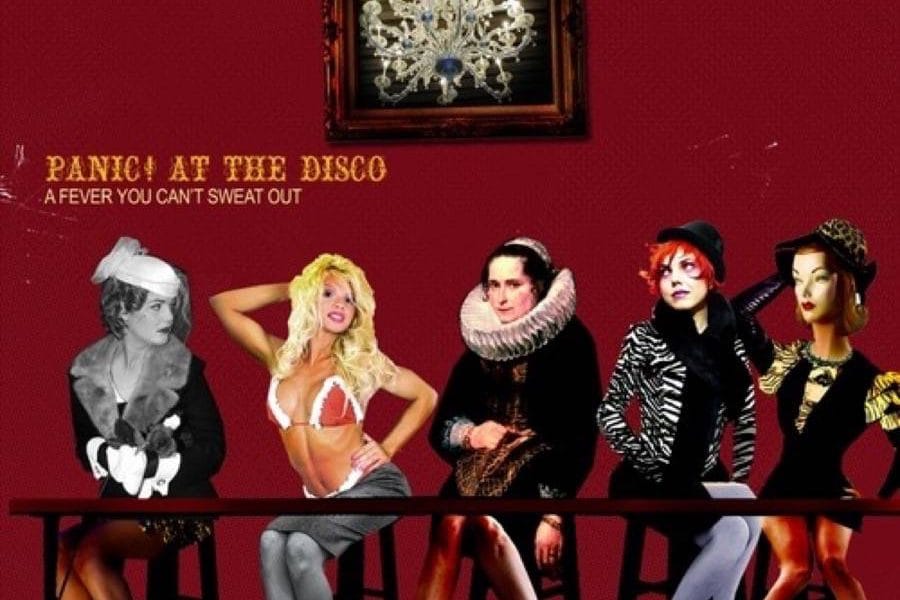There are records that history has forgotten, and then there are albums like A Fever You Can’t Sweat Out. The debut album from Panic! At The Disco (then a band, now the solo moniker of frontman Brendon Urie) is the former – it’s viewed reverently as a modern classic, with a high probability that non-fans will still be able to recite at least the chorus of its lead single, ‘I Write Sins Not Tragedies’, word for word. Given its staying power over the sixteen years since its release in 2005, why then was it condemned at the time by critics?
The answer is inconclusive at best. Bar an anomalous few, reviewers largely disparaged the album for a lack of “sincerity, creativity, or originality”, which fans have since argued vehemently against. We know at least that tracks ‘Nails For Breakfast, Tacks for Snacks’ and ‘Camisado’ were penned by lyricist Ryan Ross about his father’s struggles with alcohol abuse, an experience that only the cruelest among us (see: Pitchfork calling the band “barrel-scrapers”) would accuse him of fabricating. Singing on ‘Camisado’, Urie vocalises Ross’s nightmares: “You’re a regular decorated emergency/The bruises and contusions will remind me what you did when you wake.” While Ross’s dad passed away a year after the album was released, Rolling Stone ascribed his trauma-inspired lyrics with the quality of “whininess”.
Speaking to Blunt Magazine for a profile piece recently, producer Matt Squire noted that the unexpected success of the album, which has now been certified in the United States as triple-platinum, can be attributed in part to Ross’s words. While critics didn’t see it, fans did, as Squire articulates: “There’s a lot of depth that record that I think really clicked with people,” he asserts. Sure, retrospectively frontman Brendon Urie, the band’s only remaining member, did point out that ‘The Only Difference Between Martyrdom and Suicide is Press Coverage’ might seem pretentious, forecasting success when the band “hadn’t done anything” at that point in time. And yet, Urie crooning on the track about the band being “young” and “desperate for attention” actually seems wholeheartedly unhypocritical, especially because they were seeking attention and they did end up receiving it upon the album’s resonance globally.
A Fever You Can’t Sweat Out is also gorged on cultural references, another point of contention for critics wildly committed at the time to pulling it apart. References to Chuck Palahniuk, most notable for his penmanship of Fight Club, abound, with song titles named with quotes from his book Survivor and lyrical motifs drawn from Invisible Monsters and Diary. Famously, ‘Lying Is The Most Fun A Girl Can Have Without Taking Her Clothes Off’ is a line from Closer, the 2004 film that Fall Out Boy also referenced on their hit ‘Thnks fr the Mmrs’. Do Ross’s references turn the album into “365 days of diary scribblings too wildly haphazard in subject matters to warrant deep study”, as told by this reviewer? No, not quite. Palahniuk’s work is still lauded to this day (even referencing Panic! At The Disco recently in one of his books) and Fall Out Boy dropped ‘Thnks fr the Mmrs’ two years on from when ‘Lying’ was released, to critical acclaim.
Musically, A Fever You Can’t Sweat Out is split into two parts; its first half is somewhat pop rock, while its second half successfully experiments with older but still non-traditional instrumentation, gravitating towards theatrical and baroque influences. Squire tells that the risks the band took musically were taken because they thought that no one would ever hear the album, in addition to winging the recording process overall. “It was like, ‘If we had known it was going to be this big, we wouldn’t have done this, we wouldn’t have done that.’ And then you’re in a Catch-22, because then it wouldn’t have been as big. There was something about that record that just connected, and I think some of it’s lyrical…And then I think the fact that we didn’t know what we were doing was electric. We broke a lot of rules…We were like, ‘Yeah, put 50 vocals, put 2 violins.’ Who cares? Ten to fifteen thousand people are going to hear this.’”
Panic! At The Disco went on, after making one of the most experimental albums that our scene ever saw, to follow it up with a pivot into Beatles-esque, fantastical folk territory, before lyricist Ryan Ross and newer member Jon Walker departed the band, citing “creative differences.” There are rumours of lost demos from the Cricket & Clover sessions, which took place directly after A Fever You Can’t Sweat Out and are hoped to be sonically more loyal to their debut album than any other direction that they would take. For all intents and purposes, it does seem that they were, with the Fever-like theatricality of the ‘Nearly Witches’ demo re-appearing later in the official song released on Vices & Virtues. Those early session recordings apparently are still floating around on various members’ hard drives, so there still might be an opportunity for fans to expand their version of what might have been.
In the end, the brutal criticism of A Fever You Can’t Sweat Out was wholly unfounded. The album has sold over three million copies in the United States alone, launching the name Panic! At The Disco into a solid trajectory of success that is now cultivated solely by Urie, the last man standing under its banner. Was it the criticism that saw Panic! At The Disco take a different direction for their future, ultimately resulting in the departure of the band’s core members? Perhaps. If they had stayed on the same path, undisrupted by critique and commentaries of pretentiousness, would the follow-up album have been everything that we’d hoped for, or would the jig have sounded mediocre the second time around? We’ll never know. What we do know is that A Fever You Can’t Sweat Out holds up as one of the greatest albums of our time, and we’ll call bullshit on anyone who argues that it isn’t.







